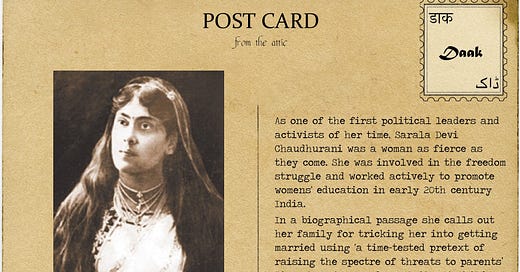A quick note: Last week, Daak turned five years old! We have absolutely loved curating Daak for all of you, and have some exciting plans in the works. If you enjoy our work, and think that others might too, we would love for you to share our newsletter with your friends and loved ones. We would also love your feedback and suggestions, or even a general hello, so please do write to us at hellodaak@gmail.com
As one of the first political leaders and activists of her time, Sarala Devi Chaudhurani (1872-1945) was a woman as fierce as they come. She was involved in the freedom struggle and actively led the anti-British movement by working with the Swadeshi movement serving the cause of nationalism. Her talents were many. She was Rabindranath Tagore’s niece and had a gift for music and proclivity towards the arts. While Tagore wrote the first two verses, she is said to have put the Indian national song, Bande Mataram, to music. Sarala Devi also worked to empower women, ensuring the spread of education, and went on to form India’s first women’s association, Bharat Stree Mahamandal.
Despite her multifaceted, strong-willed character, she too faced challenges from her family – ones all too familiar in South Asian households. We bring to you a biographical passage in which she describes her marriage. She calls out her family for tricking her into getting married using “a time-tested pretext of raising the spectre of threats to parents’ lives to get around recalcitrant children to agree to marry”. Read on to find how a headstrong feminist was coerced into an arranged marriage.
I received a long letter from my elder sister informing me that mother was in very poor health and that one did not know what turn it could take. She also added that one of my mother’s last wishes was that I should get married and that I should not take her wish lightly. My family knew my views on marriage; I would not accept anyone as my husband unless I could personally approve of the individual concerned, regardless of his social standing. Apparently, they had settled on a groom, who so my sister averred, could not but be acceptable to me…This selected person was a leading member of the Arya Samaj which had a close link with our Brahmo Samaj, besides being a reputed orator, a dedicated nationalist and most importantly, handsome.
“Come and see for yourself before making up your mind either way. Do not thoughtlessly reject this proposal which will hasten our mother’s end.” A time-tested pretext of raising the specter of threats to parents’ lives to get around recalcitrant children to agree to marry! This ploy was used to trap me.
My mother at that time was in Baidyanath trying to recover her health and, therefore, I had to head for that place instead of Calcutta. Even before I reached Baidyanath, my elder sister had conspiratorially made all arrangements for my marriage. She had almost tied me up hand and foot with no scope to make any move. From the moment I alighted at the railway station of Baidyanath, I discovered that I did so as a confirmed bride. I was whisked away in a palanquin, my feet hardly touching the ground. I found that the date of the wedding was already fixed, invitations sent out and the groom’s party had reached and was settled in another house. All this was done keeping me absolutely in the dark, in case I did anything that could upset my parents. I was utterly bewildered.
The next day was set down for the traditional pre-nuptial ritual of anointing the bride with turmeric paste, for which all the required paraphernalia had been procured in advance by my sister with the help of Sankar Pandit of Bhowanipore, the designated head of the groom’s party. Morning saw the arrival of a host of relations, including Uncle Rabi, from several parts of the country – from Bolepur, from Ranchi, from Calcutta, from Madhupur. The house teemed with friends and relations. The sehnai played wedding music throughout the day. In the evening the bride, me, had a brief glimpse of the groom. No denying, he was handsome.
The wedding took place in the evening of the following day. The formalities were concluded in due course. A predestined bond, dictated by the karma of our past lives! The die was cast; no turning back now.
From Sarala Devi Chaudurani, Jibaner Jharapata (The Fallen Leaves of Life)
Translation by Sukhendu Ray




What happened next? That’s what I would like to know.